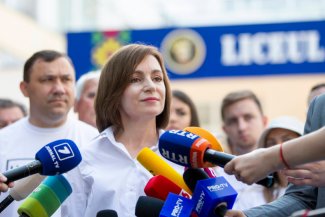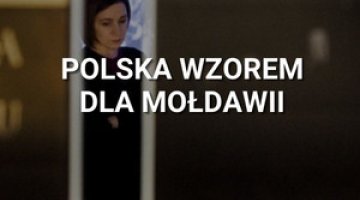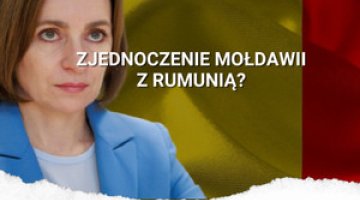Moldova: total power for pro-European forces

In the early parliamentary elections held in Moldova on 11 July, the pro-Western Action and Solidarity Party (PAS), linked to the incumbent President Maia Sandu, received the most votes. This party won 52.8% of the votes, which will give them 63 seats in the 101-seat parliament (in Moldova, parliamentarians are elected according to proportional system within one national constituency). Second place (27.22%, 32 deputies) went to the pro-Russian Communist and Socialist Electoral Bloc (BECS), which includes the Socialist Party (PSRM) led by Igor Dodon, the country’s former president (from 2016 to 2020), and the Communist Party (PCRM) under Vladimir Voronin, who was head of state from 2001 to 2009. The populist Şor Party, led and funded by Ilan Şor, also got into parliament (5.75% of the vote, 6 seats). Şor himself, who is currently resident in Israel, and has an arrest warrant out on him in Moldova, was sentenced by a court of first instance in 2017 to seven and a half years in prison for complicity in embezzlement of US$1 billion from the Moldovan banking sector in 2014. Neither the remaining 18 parties participating in the election, nor the Electoral Bloc of Renato Usatîi, a populist politician and businessman linked to Russia and the mayor of Bălți (the second largest city in Moldova, excluding Tiraspol located in separatist Transnistria), were able to cross the electoral threshold (5% for parties and 7% for coalitions).
Commentary
- The victory for the PAS, and the fact that this party has won an absolute majority in parliament, means a qualitative change and a historic breakthrough in Moldovan politics. For the first time since the 1990s, full power in the country (since December 2020 the post of president has been held by Maia Sandu, whose roots are in the PAS) will be taken over by a genuine grass-roots party which has no ties to oligarchs, and is not a tool to protect the political and business interests of its leaders and sponsors. For the first time, an absolute parliamentary majority has been won by a centre-right grouping (which is unequivocally in favour of moving the country closer to the West). This result will enable the PAS to implement the ambitious reform programme which it promoted in the spirit of the Association Agreement which Moldova signed with the EU in 2014. At the same time, it will create the conditions for the final dismantling of the oligarchic system that has been developing in Moldova since at least the late 1990s, and reached its apogee during the de facto rule of Vlad Plahotniuc, an oligarch and billionaire, leader of the Democratic Party, which held power between 2016 and 2019 and was entirely dependent on him. In that period Plahotniuc controlled the parliamentary majority, the government and the judiciary, including the Constitutional Court; this allowed him almost entirely unchecked power over the country’s politics and economy.
- Concentrating of power in the hands of one party also means the end of the political crisis that Moldova has found itself in since the parliamentary elections in February 2019. In June of that year, protracted coalition negotiations led to Plahotniuc’s flight from the country and the formation of a coalition government between the PAS and the PSRM, although it fell apart after just five months. In its place the cabinet of Prime Minister Ion Chicu, backed by the Socialists but lacking a stable majority in parliament, held on for another year before resigning in December 2020. Since then (i.e. the last seven months), the function of head of government has been performed by the acting prime minister and foreign minister Aureliu Ciocoi.
- After the PAS takes power, a number of challenges, both political and economic, await. As a result of the crisis caused by the COVID-19 pandemic, the Moldovan economy contracted by 7% in 2020; given the already poor condition of public finances, this will force the new authorities to cut budget spending. The new government will have to consider pushing through changes to the pension law. Reform in this area (gradually raising the retirement age from 57 to 63 for women, and from 62 to 63 for men) was introduced in 2016, but in December 2020 the outgoing Chicu government decided to abandon this plan and restore the original age thresholds as of 1 January 2022. In this context, the new government will undoubtedly benefit from the financial aid worth €600 million announced by the European Commission in June, which Moldova will receive in 2021–4 under a so-called economic recovery package, in the form of grants and low-interest loans. The disbursement of these funds is conditional on Chisinau’s reform of the judiciary and decisive action in the fight against corruption, moves which are already part of the PAS’s political agenda.
- The PAS’s enormous success is based on the fact that the party has successfully responded to the growing electoral fatigue with the corruption prevailing in Moldovan politics. Even during the campaign before the presidential elections in 2020, the party changed the emphasis in its message, resigning from the explicitly geopolitical topics (i.e. promoting European integration) which had hitherto formed the basis of the dispute in domestic politics, in favour of emphasising the need to make a qualitative change in the ranks of the Moldovan ruling class and purge them of dishonest and corrupt people. At the same time, the PAS criticised its main competitors, accusing them of representing oligarchic circles, having links with Plahotniuc, complicity in the aforementioned billion-dollar theft, and acting against the interests of society. During this year’s campaign, slogans calling for the need to clean up Moldova’s politics were used just as clearly: one of the PAS’s chief slogans was ‘Time for good people!’ The party also highlighted social issues in its manifesto, including the need to improve the country’s standard of living. This approach made it a more inclusive force and encouraged that part of the electorate which had usually voted for parties including the populist (and sympathetic to Russia) Our Party, whose leader Renato Usatîi called during the campaign for a definitive reckoning with corrupt politicians and long prison terms for them. In this context, it is indicative that Usatîi lost to the PAS (by 27% to 23%) even in his traditional stronghold, the Russian-speaking Bălți, despite winning the mayoral elections there in October 2019 with over 60% of the vote. Another important factor that led to a marked increase in the PAS’s popularity over the past year was the victory of Maia Sandu (the then leader of this party) in the presidential election in November 2020. She won as much as 58% of the vote, thus defeating the incumbent, the pro-Russian Igor Dodon. As a result, support for the PAS rose from 30% (data referring to ‘strong’ voters) in October 2020 to 48.6% in February 2021 (Barometrul Opiniei Publice, IPP).
- The winning party also owes its very good result to representatives of the Moldovan diaspora. A significant part of these voters are young people who have been forced to emigrate due to poor economic conditions in the country, but who maintain an interest in the situation in their home country. Over 210,000 people took part in the elections abroad, primarily in the EU, the UK and the US (this is the highest figure in the history of parliamentary elections), 86% of whom voted for the PAS. In the previous elections to the Moldovan legislature in February 2019, only 76,600 out of those entitled voted from outside the country.
- An important factor contributing to the PAS’s victory was the fact that they were able to keep their mobilisation of the electorate at a relatively high level. The PAS won a total of nearly 300,000 votes more than Sandu managed to win in the first round of the 2020 presidential election (778 thousand to 488 thousand respectively).The turnout was 48.36%, only slightly lower than in the 2019 parliamentary elections (around 50%). This is a very good result considering that many Moldovans are tired of the fact that their country has been almost constantly holding elections for the last two years (since 2019 parliamentary, local and presidential elections have been held there, and some regions have also held additional, supplementary parliamentary and local votes). The improved COVID situation also positively affected interest in the elections (both during the campaign and on voting day): the number of new daily infections had fallen to several dozen, with just single-figure numbers of deaths.
- The PAS’s main competitor, the pro-Russian BECS, used both traditional geopolitical topics and the fears of some in society about external influences that are culturally alien to it (mainly Western) in its campaign. The bloc declared a desire to defend the country against the LGBT+ movement (among others) or the alleged appearance of NATO troops in the country (personified by a dark-skinned American soldier), after whose arrival – as party leader Vladimir Voronin said – “dusky children will be born in Moldova”. The BECS presented itself as a conservative force that could ensure stability in troubled times (emphasising not only the COVID pandemic, but also the ongoing armed conflict in Ukraine and the recent clashes between Armenia and Azerbaijan) and guaranteeing the maintenance of Moldovan statehood, which, in the opinion of the bloc’s representatives, are threatened by pro-Western groups. During the campaign the de facto leader of BECS, Igor Dodon, repeatedly accused such groups of using the help of the foreign and foreign-financed internal advisers who, in his opinion, effectively govern Moldova, making it a “banana republic”. At the same time, Dodon regularly attacked Western diplomats, with the US ambassador to Moldova Dereck Hogan at their head, for allegedly interfering in Moldovan politics. This narrative was intended as a way of balancing the accusation that the Socialists were dependent on the Kremlin, and are even financed by it. Meanwhile, Russia traditionally supported the Socialist leader symbolically, politically and in the media: on 24 April this year he returned from Moscow to Chișinău on a Russian emergency services plane which was carrying 140,000 doses of the Sputnik V vaccine. The Ministry of Foreign Affairs in Moscow also Dodon’s criticism of the EU and the US.
- The campaign was accompanied by a sharp dispute over both the number of electoral committees made available for the diaspora abroad and the polling stations for those residents of separatist Transnistria who had Moldovan passports (estimated at over 200,000). The Ministry of Foreign Affairs in Chișinău, as well as the pro-European groups whom the emigrants traditionally support (including the PAS) pressed for around 200 foreign committees to be operated (instead of the existing 139), arguing that during the presidential election in 2020 many of them ran out of ballot papers, thus de facto limiting the electoral rights of part of the electorate: according to Moldovan regulations, each foreign committee carries a maximum of 5000 ballots. Ultimately, the Central Election Commission (CEC) decided to raise the number of foreign commissions to 150. At the same time, in early June, the CEC announced the opening of polling stations in territories only partially controlled by Chișinău (on the de facto border with separatist Transnistria). This decision was strongly criticised by the Moldovan Security and Intelligence Service as well as by some political forces fearing the possibility of collusion on electoral fraud, as well as the inability to properly supervise the election process in this area. Ultimately, the CEC withdrew from this idea, and 42 committees were appointed for the residents of Transnistria in the area controlled by the Chișinău government. A total of just over 28,000 people voted there; as is customary, they supported the pro-Russian groups (62%) and the populist party of Ilan Şor (6.25%). Almost 14% voted for the PAS. Overall – surprisingly – pro-European (or at least nominally pro-European) parties won over 20% of the vote in the separatist republic.
- In recent years, a systematic decline in the Moldovan public’s support for pro-Russian groups has been observed. This is mainly related to ongoing generational change. The core electorate of such parties consists (next to the Russian-speaking minorities, whose number in Moldova is estimated at around 20%) mainly of elderly people (predominantly pensioners), who miss the relative social security offered by the Communist regime. The vast majority of them receive very low pensions (amounting to around €100 a month on average) due to the country’s poor economic situation, a condition that has been ongoing for many years. This social group is being systematically replaced by the young generation entering adulthood, which to a large extent is either uninterested in political life (and therefore does not participate in elections) or supports parties advocating reform, the fight against corruption and the modernisation of the country. The decline in the popularity of pro-Russian groups has also been favoured by the radical reduction in the economic ties between Russia and Moldova in recent years. This is evidenced by both trade data (in 2020 only 9% of Moldovan exports went to Russia, compared to almost 20% in 2014) and currency transfers. Whereas in 2015 43% of all remittances transferred to the country from economic migrants came from Russia, in 2020 this share fell to only 13.8%. Larger amounts were received from guest workers employed in Israel (18.6%) and Italy (14%).





